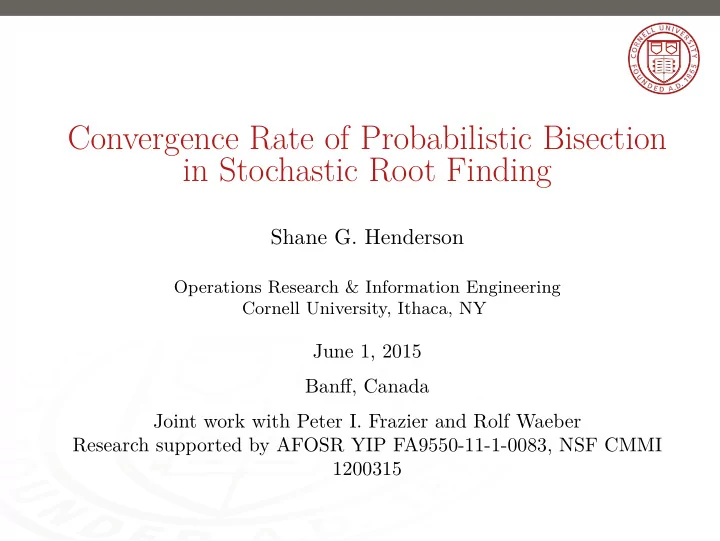

Convergence Rate of Probabilistic Bisection in Stochastic Root Finding Shane G. Henderson Operations Research & Information Engineering Cornell University, Ithaca, NY June 1, 2015 Banff, Canada Joint work with Peter I. Frazier and Rolf Waeber Research supported by AFOSR YIP FA9550-11-1-0083, NSF CMMI 1200315
Probabilistic Bisection Search for Stochastic Root Finding Stochastic Root Finding • Suppose g : [0 , 1] → R is decreasing, has unique root. • g ( x ) is observed with noise, Y ( x ) = g ( x ) + ǫ ( x ) • Goal: Locate the root • Instead of stochastic approximation, use probabilistic bisection • Assumes oracle indicates direction of root from any x and is correct with probability p > 1 / 2 (independent of x ) 1/6
Probabilistic Bisection Search for Stochastic Root Finding The Probabilistic Bisection Algorithm Horstein 63 • Input: Z n ( X n ) := sign( Y n ( X n )). • Assume a prior density f 0 on [0 , 1]. n = 0, X n = 0.5, Z n (X n ) = −1 X* 2 f n (x) 1 0 0 1 X n 2/6
Probabilistic Bisection Search for Stochastic Root Finding The Probabilistic Bisection Algorithm Horstein 63 • Input: Z n ( X n ) := sign( Y n ( X n )). • Assume a prior density f 0 on [0 , 1]. n = 0, X n = 0.5, Z n (X n ) = −1 n = 1, X n = 0.38462, Z n (X n ) = −1 X* X* 2 2 f n (x) f n (x) 1 1 0 0 0 1 0 1 X n X n 2/6
Probabilistic Bisection Search for Stochastic Root Finding The Probabilistic Bisection Algorithm Horstein 63 • Input: Z n ( X n ) := sign( Y n ( X n )). • Assume a prior density f 0 on [0 , 1]. n = 0, X n = 0.5, Z n (X n ) = −1 n = 1, X n = 0.38462, Z n (X n ) = −1 X* X* 2 2 f n (x) f n (x) 1 1 0 0 0 1 0 1 X n X n n = 2, X n = 0.29586, Z n (X n ) = 1 X* 2 f n (x) 1 0 0 1 X n 2/6
Probabilistic Bisection Search for Stochastic Root Finding The Probabilistic Bisection Algorithm Horstein 63 • Input: Z n ( X n ) := sign( Y n ( X n )). • Assume a prior density f 0 on [0 , 1]. n = 0, X n = 0.5, Z n (X n ) = −1 n = 1, X n = 0.38462, Z n (X n ) = −1 X* X* 2 2 f n (x) f n (x) 1 1 0 0 0 1 0 1 X n X n n = 2, X n = 0.29586, Z n (X n ) = 1 n = 3, X n = 0.36413, Z n (X n ) = 1 X* X* 2 2 f n (x) f n (x) 1 1 0 0 0 1 0 1 X n X n 2/6
Probabilistic Bisection Search for Stochastic Root Finding Stochastic Root-Finding Revisited X* g(x) 0 0 1 � sign ( g ( X n )) with probability p ( X n ) , Z n ( X n ) = − sign ( g ( X n )) with probability 1 − p ( X n ) . 3/6
Probabilistic Bisection Search for Stochastic Root Finding Stochastic Root-Finding Revisited 1 X* p(x) X* g(x) 0 0.5 0 0 1 0 1 � sign ( g ( X n )) with probability p ( X n ) , Z n ( X n ) = − sign ( g ( X n )) with probability 1 − p ( X n ) . 3/6
Probabilistic Bisection Search for Stochastic Root Finding Stochastic Root-Finding Revisited 1 X* p(x) X* g(x) p 0 0.5 0 0 1 0 1 � sign ( g ( X n )) with probability p ( X n ) , Z n ( X n ) = − sign ( g ( X n )) with probability 1 − p ( X n ) . 3/6
Probabilistic Bisection Search for Stochastic Root Finding Sequential Tests • Generate a new signal Z ′ ( x ) using a sequential test of power one • For x � = x ∗ , test halts in finite time and is correct with user-specifed probability at least p c > 1 / 2 • Use PBA with such a p c • Exponential convergence in n ... • At x , expected running time θ − 2 | ln | ln θ || , θ = p ( x ) − 1 / 2 • Slows down as x → x ∗ 4/6
Probabilistic Bisection Search for Stochastic Root Finding Performance Bisection, p = 0.75, ε n ~ N(0,1) 0.5 X* − X n 0 −0.5 0 1 2 3 4 5 10 10 10 10 10 10 T n 5/6
Probabilistic Bisection Search for Stochastic Root Finding Convergence For any fixed ǫ ∈ (0 , 1 / 2), T 1 / 2 − ǫ n +1 ( ˆ X n − x ∗ ) ⇒ 0 as n → ∞ , where n 1 N 1 / 2 − ǫ ˆ � X n = X i . i i =0 N 1 / 2 − ǫ � n i =0 i What about the more natural (and empirically better) n − 1 1 � N i X i ? T n i =0 6/6
Recommend
More recommend